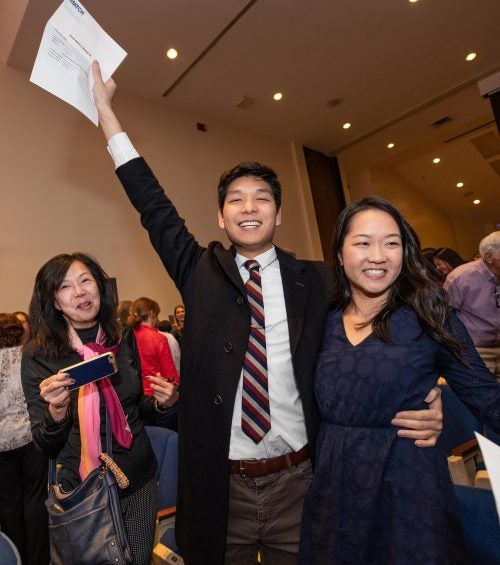Primary care leads the way (again) at ECU’s physician residency match event

Wesley Yang, a fourth-year medical student at ECU’s Brody School of Medicine, reacts to learning he will be completing his internal medicine residency at Eastern Virginia Medical School in Norfolk, Virginia.
A mother of five and a former professional football player were among the fourth-year medical students gathered in the auditorium of ECU’s Brody School of Medicine on Friday to learn where they would be spending the next three to seven years completing residency training.
Surrounded by their peers, professors and family members, all 73 students from Brody’s Class of 2019 who submitted a rank list in the National Resident Matching Program (NRMP) system for the 2018-2019 application cycle learned that they had matched to a residency program.
According to the NRMP, the postgraduate year one (PGY-1) match rate for U.S. medical school seniors has historically been 92-95 percent.
In keeping with Brody’s mission to tackle North Carolina’s need for more primary care physicians, especially in rural and underserved areas, more than 50 percent of those 73 graduates – all of whom are North Carolina residents – will be entering primary care residencies.
“This year’s Match results highlight Brody’s continued commitment to our three-fold mission to increase the supply of primary care physicians to serve the state, improve the health of citizens in eastern North Carolina and enhance the access of minority and disadvantaged students to a medical education,” said Dr. Susan Schmidt, Brody’s associate dean for student affairs. “Brody delivers on its mission – it always has.”
When Consola Esambe Lobwede moved to Charlotte from Cameroon in 2004, the opportunities that the United States offered inspired her to follow her education. After working as a nurse, she decided to apply to medical school.
Brody was the only medical school to grant an interview to Esambe Lobwede, who was a mother of four at the time.
On Friday, she held her 5-week-old daughter, Charlotte, in her arms as she found out that she was accepted into the Greenville Health System/University of South Carolina’s psychiatry residency program in Greenville, S.C.
“This is like the ultimate prize. It’s so wonderful,” she said, adding that her husband, Fidelis, encouraged her to follow her dreams by being a stay-at-home dad until the school and family demands eased enough for him to be able to take a job as a cab driver.
“It was hard; it was really hard,” she said of juggling five kids with the demands of medical school. “So Brody means the world to me. It’s been like a great family for me here. The staff, the faculty, everybody has been so very supportive. If I had to do it all again, I would do it all the same way.”
Adam O’Connor is also a “non-traditional” medical student. Not only did he earn his undergraduate degree in history, but he also spent time playing in the National Football League and NFL Europa before deciding to pursue a career in medicine.
When O’Connor opened his Match Day envelope, he learned that he matched with his first choice, University of Virginia, in emergency medicine.
“I’m in shock right now. Because after it’s all said and done, and you get your number one spot, you feel validated in many ways,” he said. “Emergency medicine is the perfect conglomeration of all the things I like about medicine. So this is a tremendous opportunity.”
Like Esambe Lobwede, O’Connor – a former standout at Ragsdale High School in Jamestown – said Brody was the first medical school to “choose” him.
“Brody right out of the gate gave me the opportunity, and I was kind of like, ‘I’m going to dance with the one who brung me,’” he said. “I could not have made a better decision. It’s a great group of folks, a great environment and honestly, it’s gotten me where I want to be.”
Nearly 25 percent of Brody’s graduating students matched to residency programs in North Carolina. And about 11 percent will remain at Vidant Medical Center, Brody’s affiliated teaching hospital, for their residency training.
Before they can independently provide direct patient care, U.S. medical school graduates must complete a three- to seven-year residency program accredited in a recognized medical specialty. The NRMP places applicants for postgraduate medical training positions into the various residency programs at teaching hospitals across the nation. Thousands of graduating medical students nationwide learned their destinations today.
The 2019 Main Residency Match was the largest ever, according to the NRMP. A record-high 38,376 applicants submitted program choices for 35,185 positions – the most ever offered in the Match. (For more info visit: www.nrmp.org.)
Results of the Main Residency Match are closely watched because they can predict future changes in the physician workforce.
###
ECU News Services
Howard House, 1001 E. Fifth Street
Greenville, NC 27858
ecunews@ecu.edu
Phone: 252-328-6481
news.ecu.edu
Contact: Rob Spahr, ECU Health Sciences Communications, spahrr18@ecu.edu
Telephone: 252-744-2482